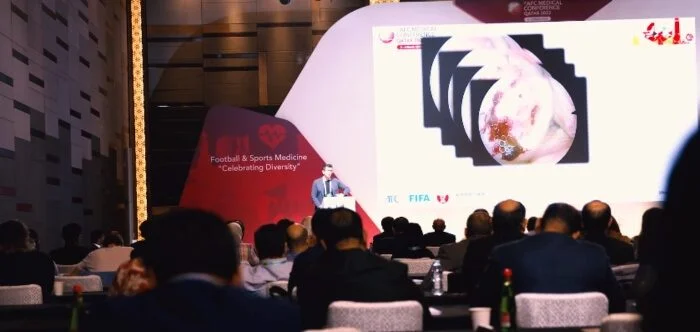Managing the social dynamics during a medical conference might be just as important as learning new information. A key aspect of this is mastering the art of introduction. So, “How do you introduce yourself in a Medical Conference?” The answer lies in being short yet informative.
Simply start by sharing your name, professional title, and the name of your institution or practice. This sets a clear professional context. Then, briefly touch upon your specialty, highlighting areas of interest or expertise that could spark further discussion.
Remember, the goal is to be concise and professional while leaving room for future conversations. Curious about more tips and nuances in networking at medical conferences? Keep reading to discover effective strategies to make meaningful connections in the medical community.
What the Medical Conferences is About?
Medical conferences are vital hubs for healthcare professionals to exchange ideas, learn about advancements, and network. They typically feature keynote speeches, panel discussions, and poster presentations. Attendees include doctors, researchers, and industry representatives, all sharing a passion for medical progress.

Networking is a key aspect of these events, offering chances to build professional relationships and collaborations. Workshops and breakout sessions provide hands-on experience and in-depth knowledge on specific topics. These gatherings are also ideal for discussing the latest research and clinical practices.
The impact of these conferences on healthcare management extends beyond the event, influencing future medical practices and policies. They foster a sense of community among professionals from various specialties. Overall, medical conferences are essential for continuous learning and professional development in healthcare.
Significance of First Impression in Medical Conference
First impressions at medical conferences set the tone for future interactions and opportunities. They are the initial step in building a professional network. Making a positive first impression can open doors to collaborative projects and career advancement.
- Establishing Credibility: A strong first impression demonstrates your professionalism and expertise in the field. It makes colleagues and industry leaders take notice of your potential contributions.
- Facilitating Networking: Good first impressions ease the process of networking, fostering meaningful connections. They lay the groundwork for collaborations and mentorship opportunities.
- Enhancing Visibility: Being memorable in a positive way increases your visibility among peers and leaders. This can lead to invitations to speak, collaborate, or contribute to publications.
- Building Confidence: A positive first impression boosts your confidence in a professional setting. It empowers you to engage more actively and contribute meaningfully to discussions.
- Creating Opportunities: Often, first impressions lead to unexpected opportunities, such as research collaborations or job offers. They can shape your career path in significant ways.
- Influencing Perceptions: The way others perceive you initially can influence ongoing professional relationships. A good first impression fosters respect and trust from the start.
First impressions at medical conferences are more than just a formal courtesy; they are foundational to your professional journey. They pave the path for future growth, collaboration, and success in the medical field.
How Do You Introduce Yourself in a Medical Conference?
Introducing yourself effectively at a medical conference is an art that combines professionalism with personal flair. It’s about making a memorable first impression while establishing your professional credentials. Here is a step-by-step guide on how to introduce yourself at a medical conference:
Step-1. Start with a Smile and a Firm Handshake
Initiate your introduction with a genuine, engaging smile and a firm, assured handshake. This non-verbal greeting is universally acknowledged as a sign of openness and confidence. It sets a positive, professional tone, indicating your eagerness to interact and engage.
Step-2. Clearly State Your Name
Pronounce your name clearly and at a pace that’s easy to follow. If your name is unique, you might briefly explain its origin or correct pronunciation. This helps in making your name memorable and avoids any potential confusion later on.
Step-3. Mention Your Professional Title and Institution
Provide your professional title and the name of your institution or organization, adding any relevant department or division. This information is essential to establish your professional identity and expertise. If your role is interdisciplinary or involves a niche field, a brief elaboration can be insightful.
Step-4. Briefly Describe Your Specialty
Concisely describe your medical specialty, highlighting any specific areas of focus or recent advancements you are involved with. Sharing a notable achievement or current project you’re excited about can spark interest and demonstrate your passion and engagement in your field.
Step-5. Share Your Purpose at the Conference
Discuss your reasons for attending the conference, whether it’s to learn about new advancements, present your research, or network with peers. This can lead to shared interests and open up avenues for meaningful dialogue.
Step-6. Be Mindful of Body Language
Employ positive body language, like maintaining good posture and eye contact. This reinforces your words and shows that you are genuinely interested in the interaction. Remember, non-verbal cues can be as impactful as verbal communication.
Step-7. Be Open to Further Conversation
End your introduction by expressing your enthusiasm for further discussion or exchanging ideas. Offer your business card or suggest connecting on professional networks like LinkedIn. This demonstrates your interest in building a professional relationship beyond the initial introduction.
By enriching these key steps, your introduction at a medical conference becomes not just a formality, but a powerful tool for establishing meaningful professional connections. Each detail you add helps in forming a comprehensive, memorable image of your professional persona.
Popular Types of Medical Conferences Where You Can Introduce Yourself
Medical conferences are essential platforms for professionals to share knowledge, network, and stay updated on the latest in healthcare. These gatherings vary in focus, size, and format, each offering unique opportunities for introductions and connections. Here are some popular types of medical conferences where you can effectively introduce yourself.
General Medical Conferences
These conferences cover a broad range of medical topics and attract a diverse audience. They are ideal for general practitioners and healthcare administrators. Networking opportunities are vast, from meeting specialists to industry experts. Attendees can gain insights into multiple fields, fostering interdisciplinary collaboration.
Specialist Symposia
Focused on specific medical specialties like cardiology or neurology, these symposia are perfect for specialists. They provide a platform to discuss the latest research and treatment advancements. Attending these events can help establish your expertise in your specialty. They also offer chances to connect with leading experts in your field.
Academic and Research Conferences
Aimed at researchers and academics, these conferences focus on medical science and research. They are great for presenting papers, discussing innovative research, and meeting fellow researchers. These events are critical for those seeking collaboration in cutting-edge medical research.
Pharmaceutical and Medical Device Conferences
These are tailored for professionals in the pharmaceutical and medical device industries. They provide updates on new drugs and technologies. Networking here can lead to collaborations on clinical trials or product development. Such conferences are also key for learning about regulatory changes and market trends.
Healthcare Management and Policy Conferences
Targeting healthcare managers, policymakers, and administrators, these conferences discuss healthcare management and policy. They offer insights into healthcare systems, management strategies, and policy developments. Networking is geared towards improving healthcare delivery and operational efficiency.
Continuing Medical Education (CME) Conferences
CME conferences are essential for professionals seeking to update their knowledge and skills. They cover a wide range of topics and offer credits for continuing education. These conferences are key for staying current in your field and meeting others committed to lifelong learning.
Whether you’re a practitioner, researcher, or healthcare administrator, there’s a medical conference tailored to your interests and professional needs. Each type of conference offers unique opportunities to introduce yourself, expand your network, and stay abreast of the latest developments in the medical field.
Dos and Don’ts of Self-Introductions in a Medical Conference
Making meaningful connections at medical conferences involves understanding the complexity of self-introductions. Effective introductions can open doors to collaborations and learning opportunities. Here are some dos and don’ts to ensure your introductions are impactful and well-received.
Dos
- Be Prepared: Have a clear, concise introduction ready. Include your name, role, and a brief mention of your interests or current projects.
- Engage with a Smile: Start with a friendly demeanor. A smile can set a positive tone and make you more approachable.
- Listen Actively: Show genuine interest in others’ introductions. Active listening can lead to more meaningful conversations and connections.
- Exchange Contact Information: Offer your business card or digital contact info. This facilitates future communication and networking opportunities.
- Follow-up: Send a brief follow-up message after the conference. This reinforces your new connections and shows you value the interaction.
Don’ts
- Don’t Overshare: Avoid going into lengthy personal stories or excessive detail. Keep the focus on relevant professional information.
- Don’t Interrupt: Respect others when they are speaking. Interrupting can be perceived as rude and may hinder forming a positive connection.
- Don’t Be Overly Salesy: Refrain from turning your introduction into a sales pitch. The goal is to network and build relationships, not immediately sell a product or service.
Mastering the balance of being informative and engaging, while being respectful and attentive, is key during self-introductions at medical conferences. These dos and don’ts will help you create a positive and lasting impression, paving the way for successful professional relationships.
Introducing Yourself in a Medical Conference- How Does it Benefit You?
Effective self-introduction at a medical conference is more than a mere formality; it’s a strategic step toward enriching your professional journey. It’s an opportunity to create a lasting impression and open doors to numerous benefits. Here’s how introducing yourself can be advantageous in such settings.
Establishes Professional Identity
Introducing yourself clearly articulates who you are and what you bring to the medical community. It’s essential for setting you apart in a field where reputation and expertise matter greatly. This personal branding is vital for career advancement and peer recognition.
Expands Networking Opportunities
A compelling introduction acts as a gateway to new professional relationships. It invites conversations with potential collaborators, mentors, and industry innovators. These connections can lead to future project collaborations, job offers, or research partnerships.
Facilitates Knowledge Exchange
Introducing yourself opens the door to diverse perspectives and insights. This exchange is invaluable in a rapidly evolving field like medicine. It allows you to stay informed about the latest developments and share your own experiences and research.
Enhances Visibility in Your Field
Standing out through a memorable introduction increases your chances of being remembered by key individuals. Increased visibility can lead to more invitations for collaborations, speaking opportunities, or leadership roles in medical committees or associations.
Builds Confidence and Communication Skills
Regular practice in introducing yourself polishes your interpersonal and communication skills. It enhances your ability to present yourself confidently in various professional scenarios, an essential skill in any medical career.
Creates Potential for Mentorship and Guidance
A well-executed introduction can be the start of a valuable mentor-mentee relationship. Gaining a mentor in medicine can accelerate your career development, offering guidance, support, and invaluable industry insights.
Mastering the art of self-introduction at medical conferences can significantly impact your career trajectory in the medical field. It’s not just about making a good first impression; it’s about establishing a foundation for ongoing professional development, opportunities, and success in the ever-changing world of healthcare.
Bottom Line
Mastering “How do you introduce yourself in a Medical Conference?” is an essential skill for any healthcare professional. It’s the first step in establishing a strong presence in the medical community.
A well-crafted introduction opens up numerous networking opportunities, fostering connections that can lead to collaborative projects and mentorship. It sets a foundation for professional growth and visibility in your field.
In essence, perfecting your self-introduction at medical conferences is pivotal for career advancement and making lasting professional impacts. This skill is a gateway to opportunities and a crucial part of your journey in the ever-evolving world of healthcare.








